Fleurs du Mal Magazine


Or see the index
De Nederlandse dichter en prozaschrijver Sybren Polet is op 19 juli 2015 Amsterdam overleden.
Polet debuteerde als dichter in 1946 met de bundel Genesis. Hij was jarenlang medewerker en redacteur van het literaire tijdschrift Podium. In 1961 verscheen zijn eerste roman Breekwater.
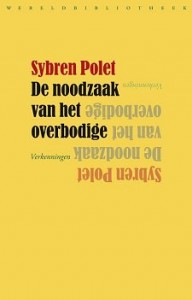 Het proza van Sybren Polet had een sterk experimenteel en vernieuwend karakter, waarbij hij de grenzen tussen genres en de conventies inzake structuur en chronologie wist te doorbreken. Ondanks een groeiende weerstand tegen het literaire experiment, zou Polet dit genre zijn leven lang blijven beoefenen. Hij koos zelf voor de term Ander proza.
Het proza van Sybren Polet had een sterk experimenteel en vernieuwend karakter, waarbij hij de grenzen tussen genres en de conventies inzake structuur en chronologie wist te doorbreken. Ondanks een groeiende weerstand tegen het literaire experiment, zou Polet dit genre zijn leven lang blijven beoefenen. Hij koos zelf voor de term Ander proza.
Sybren Polet ontving veel waardering voor zijn literaire werk door middel van diverse literaire prijzen:
1959 – Jan Campert-prijs voor Geboorte-stad
1959 – Poëzieprijs van de gemeente Amsterdam voor Vleselijke stad
1972 – Herman Gorterprijs voor Persoon/onpersoon
1973 – Busken Huetprijs voor Literatuur als werkelijkheid. Maar welke?
2003 – Constantijn Huygens-prijs voor zijn gehele oeuvre
2005 – Dirk Martensprijs voor Een geschreven leven
fleursdumal.nl magazine
More in: Archive O-P, BIOGRAPHY, EXPRESSIONISM, DADA & DE STIJL, SURREALISM, In Memoriam
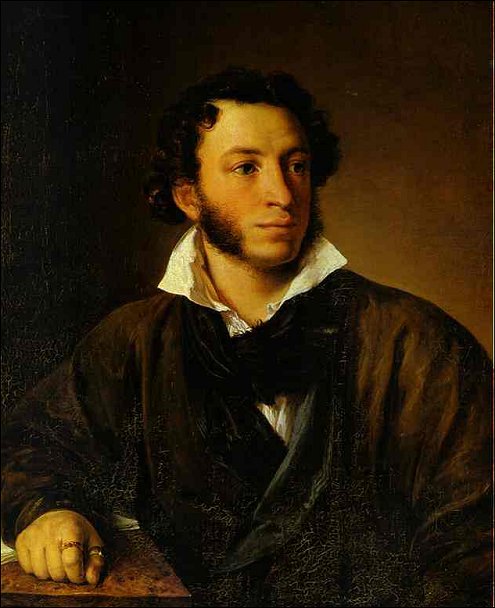
Alexander Pushkin
(1799 – 1837)

fleursdumal.nl magazine
More in: Archive O-P, Poesjkin, Aleksandr
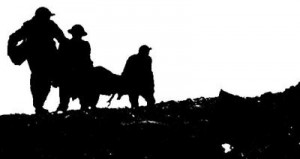
Wilfred Owen
(1893-1918)
Anthem for Doomed Youth
What passing bells for these who die as cattle?
– Only the monstrous anger of the guns.
Only the stuttering rifles’ rapid rattle
Can patter out their hasty orisons.
No mockeries now for them; no prayers nor bells;
Nor any voice of mourning save the choirs, –
The shrill demented choirs of wailing shells;
And bugles calling for them from sad shires.
What candles may be held to speed them all?
Not in the hands of boys, but in their eyes
Shall shine the holy glimmers of goodbyes.
The pallor of girls’ brows shall be their pall;
Their flowers the tenderness of patient minds,
And each slow dusk a drawing-down of blinds.
Wilfred Owen poetry
fleursdumal.nl magazine
More in: Archive O-P, Owen, Wilfred
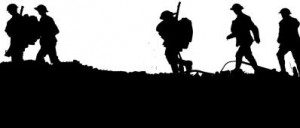
Wilfred Owen
(1893 – 1918)
A Terre
(being the philosophy of many soldiers)
Sit on the bed. I’m blind, and three parts shell.
Be careful; can’t shake hands now; never shall.
Both arms have mutinied against me,-brutes.
My fingers fidget like ten idle brats.
I tried to peg out soldierly,-no use!
One dies of war like any old disease.
This bandage feels like pennies on my eyes.
I have my medals?-Discs to make eyes close.
My glorious ribbons?-Ripped from my own back
In scarlet shreds. (That’s for your poetry book.)
A short life and a merry one, my buck!
We used to say we’d hate to live dead-old,-
Yet now…I’d willingly be puffy, bald,
And patriotic. Buffers catch from boys
At least the jokes hurled at them. I suppose
Little I’d ever teach a son, but hitting,
Shooting, war, hunting, all the arts of hurting.
Well, that’s what I learnt,-that, and making money.
Your fifty years ahead seem none too many?
Tell me how long I’ve got? God! For one year
To help myself to nothing more than air!
One Spring! Is one too good to spare, too long?
Spring wind would work its own way to my lung,
And grow me legs as quick as lilac-shoots.
My servant’s lamed, but listen how he shouts!
When I’m lugged out, he’ll still be good for that.
Here in this mummy-case, you know, I’ve thought
How well I might have swept his floors for ever.
I’d ask no nights off when the bustle’s over,
Enjoying so the dirt. Who’s prejudiced
Against a grimed hand when his own’s quite dust,
Less live than specks that in the sun-shafts turn,
Less warm than dust that mixes with arms’ tan?
I’d love to be a sweep, now, black as Town,
Yes, or a muckman. Must I be his load?
O Life, Life, let me breathe,-a dug-out rat!
Not worse than ours the lives rats lead-
Nosing along at night down some safe rut,
They find a shell-proof home before they rot.
Dead men may envy living mites in cheese,
Or good germs even. Microbes have their joys,
And subdivide, and never come to death.
Certainly flowers have the easiest time on earth.
‘I shall be one with nature, herb, and stone’
Shelley would tell me. Shelley would be stunned:
The dullest Tommy hugs that fancy now.
‘Pushing up daisies’ is their creed, you know.
To grain, then, go my fat, to buds my sap,
For all the usefulness there is in soap.
D’you think the Boche will ever stew man-soup?
Some day, no doubt, if…Friend, be very sure
I shall be better off with plants that share
More peaceably the meadow and the shower.
Soft rains will touch me,-as they could touch once,
And nothing but the sun shall make me ware.
Your guns may crash around me. I’ll not hear;
Or, if I wince, I shall not know I wince.
Don’t take my soul’s poor comfort for your jest.
Soldiers may grow a soul when turned to fronds,
But here’s the thing’s best left at home with friends.
My soul’s a little grief, grappling your chest,
To climb your throat on sobs; easily chased
On other sighs and wiped by fresher winds.
Carry my crying spirit till it’s weaned
To do without what blood remained these wounds.
Wilfred Owen poetry
fleursdumal.nl magazine
More in: *War Poetry Archive, Archive O-P, Owen, Wilfred
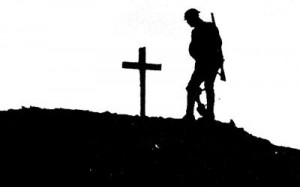
Wilfred Owen
(1893 – 1918)
Arms and the Boy
Let the boy try along this bayonet-blade
2How cold steel is, and keen with hunger of blood;
Blue with all malice, like a madman’s flash;
And thinly drawn with famishing for flesh.
Lend him to stroke these blind, blunt bullet-heads
Which long to muzzle in the hearts of lads.
Or give him cartridges of fine zinc teeth,
Sharp with the sharpness of grief and death.
For his teeth seem for laughing round an apple.
There lurk no claws behind his fingers supple;
And God will grow no talons at his heels,
Nor antlers through the thickness of his curls.
Wilfred Owen poetry
fleursdumal.nl magazine
More in: Archive O-P, Owen, Wilfred
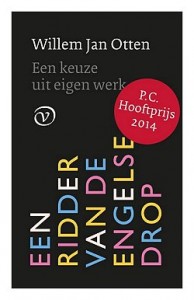
Willem Jan Otten kreeg in 2014 de P.C. Hooftprijs toegekend voor zijn gehele oeuvre. Dit vanwege de uitzonderlijke kwaliteit van zijn werk als essayist. Datzelfde jaar verscheen een nieuwe verzameling essays getiteld ‘Droomportaal’ met maar liefst tien essays over film.
Willem Jan Otten
VPRO Boeken
zondag 7 december,
NPO 1, 11.20 uur
# Meer info website VPRO BOEKEN
fleursdumal.nl magazine
More in: Archive O-P, Art & Literature News, Otten, Willem Jan

Lezing en voordracht van The Raven van E.A. Poe in Museum Meermanno / Huis van het boek, Den Haag
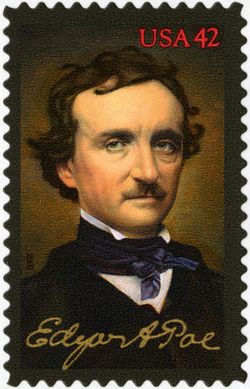 Op zaterdag 30 augustus spreekt Johan Vandendriessche over ‘The Raven’ van Edgar Allan Poe en draagt hij het gedicht voor.
Op zaterdag 30 augustus spreekt Johan Vandendriessche over ‘The Raven’ van Edgar Allan Poe en draagt hij het gedicht voor.
‘The Raven’ van Edgar Allan Poe (1809 – 1849) is één der meest beklijvende gedichten uit de Amerikaanse literatuur. Wat zit er achter de symboliek? Hoe breng je dit gedicht uit 1845 vandaag, in het Nederlands, met respect voor de originele versie? Wat doet dit gedicht met een mens, die er lang mee bezig is? En welke dualiteit spookte door het brein van Poe? Johan Vandendriessche (Bibliotheek Permeke – Antwerpen) duikt samen met de raaf in een tolvlucht naar de kern van het gedicht.
Na de lezing en voordracht van het gedicht is er gelegenheid voor vragen. De lezing wordt afgesloten met koffie en thee. Tevens kunt u de tentoonstelling ‘Vogels. Duizenden vogels in honderden boeken’ bezoeken en de nieuwe aanwinsten van het museum met onder meer een geïllustreerde uitgave van ‘The Raven’ door de Cheloniidae Press met etsen en houtgravuren van kunstenaar Alan James Robinson.
De lezing is van 14.00 tot 15.00 uur, waarna koffie en thee wordt geserveerd. (Inloop vanaf 13.30)
Kosten en aanmelden: de lezing kost € 5,- exclusief museumentree. Zie voor meer informatie over lezing, tentoonstelling en andere activiteiten: www.meermanno.nl
Huis van het boek
Museum Meermanno
Prinsessegracht 30
2514 AP Den Haag
T 070 34 62 700
info@meermanno.nl
www.meermanno.nl
fleursdumal.nl magazine
More in: Archive O-P, Art & Literature News, Poe, Edgar Allan, Tales of Mystery & Imagination
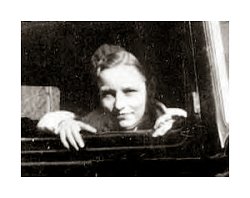
Bonnie Elizabeth Parker
(1910 – 1934)
The Street Girl
You don’t want to marry me honey,
Though just to hear you ask me is sweet;
If you did you’d regret it tomorrow
For I’m only a girl of the street.
Time was when I’d gladly have listened,
Before I was tainted with shame,
But it wouldn’t be fair to you honey;
Men laugh when they mention my name.
Back there on the farm in Nebraska,
I might have said yes to you then,
But I thought the world was a playground;
Just teeming with Santa Claus men.
So I left the old home for the city,
To play in its mad, dirty whirl,
Never knowing how little of pity,
It holds for a slip of a girl.
You think I’m still good-looking honey!
But no I am faded and spent,
Even Helen of Troy would look seedy,
If she followed the pace I went.
But that day I came in from the country,
With my hair down my back in a curl;
Through the length and the breadth of the city,
There was never a prettier girl.
I soon got a job in the chorus,
With nothing but looks and a form,
I had a new man every evening,
And my kisses were thrilling and warm.
I might have sold them for a fortune,
To some old sugar daddy with dough,
But youth called to youth for its lover,
There was plenty that I didn’t know.
Then I fell for the ‘line’ of a ‘junker’,
A slim devotee of hop,
And those dreams in the juice of a poppy;
Had got me before I could stop.
But I didn’t care while he loved me,
Just to lie in his arms was a delight,
But his ardour grew cold and he left me;
In a Chinatown ‘hop-joint’ one night.
Well I didn’t care then what happened,
A Chink took me under his wing,
And down there in a hovel of hell —
I laboured for Hop and Ah-Sing
Oh no I’m no longer a ‘Junker’,
The police came and got me one day,
And I took the one cure that is certain,
That island out there in the bay.
Don’t spring that old gag of reforming,
A girl hardly ever goes back,
Too many are eager and waiting;
To guide her feet off of the track.
A man can break every commandment
And the world will still lend him a hand,
Yet a girl that has loved, but un-wisely
Is an outcast all over the land.
You see how it is don’t you honey,
I’d marry you now if I could,
I’d go with you back to the country,
But I know it won’t do any good,
For I’m only a poor branded woman
And I can’t get away from the past.
Good-bye and God bless you for asking
But I’ll stick out now till the last.
Bonnie (from Bonnie & Clyde) Parker poetry
fleursdumal.nl magazine
More in: Archive O-P, Archive O-P, Bonnie and Clyde, Bonnie Parker, CRIME & PUNISHMENT
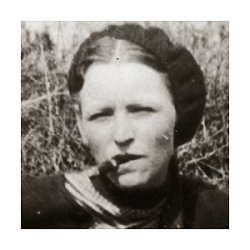
Bonnie Elizabeth Parker
(1910 – 1934)
Outlaws
Billy the Kid and Clyde Barrow
Billy rode on a pinto horse
Billy the Kid I mean
And he met Clyde Barrow riding
In a little gray machine
Billy drew his bridle rein
And Barrow stopped his car
And the dead man talked to the living man
Under the morning star
Billy said to the Barrow boy
Is this the way you ride
In a car that does its ninety per
Machine guns at each side?
I only had my pinto horse
And my six-gun tried and true
I could shoot but they got me
And someday they will get you!
For the men who live like you and me
Are playing a losing game
And the way we shoot, or the way we ride
Is all about the same
And the like of us may never hope
For death to set us free
For the living are always after you
And the dead are after me
Then out of the East arose the sound
Of hoof-beats with the dawn
And Billy pulled his rein and said
I must be moving on
And out of the West came the glare of a light
And the drone of a motor’s song
And Barrow set his foot on the gas
And shouted back, ‘So long’
So into the East, Clyde Barrow rode
And Billy, into the West
The living man who can know no peace
And the dead who can know no rest
Bonnie Parker
Outlaws — Billy the Kid and Clyde Barrow
Billy rode on a pinto horse
Billy the Kid I mean
And he met Clyde Barrow riding
In a little gray machine
Billy drew his bridle rein
And Barrow stopped his car
And the dead man talked to the living man
Under the morning star
Billy said to the Barrow boy
Is this the way you ride
In a car that does its ninety per
Machine guns at each side?
I only had my pinto horse
And my six-gun tried and true
I could shoot but they got me
And someday they will get you!
For the men who live like you and me
Are playing a losing game
And the way we shoot, or the way we ride
Is all about the same
And the like of us may never hope
For death to set us free
For the living are always after you
And the dead are after me
Then out of the East arose the sound
Of hoof-beats with the dawn
And Billy pulled his rein and said
I must be moving on
And out of the West came the glare of a light
And the drone of a motor’s song
And Barrow set his foot on the gas
And shouted back, ‘So long’
So into the East, Clyde Barrow rode
And Billy, into the West
The living man who can know no peace
And the dead who can know no rest
Bonnie Parker poetry
fleursdumal.nl magazine
More in: Archive O-P, Archive O-P, Bonnie and Clyde, Bonnie Parker, CRIME & PUNISHMENT
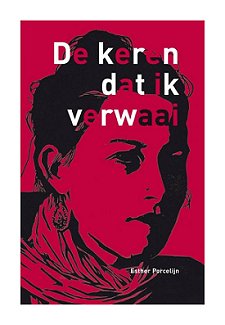
Herfst,
Laat mij nog even niet veranderen,
Laat mij nog even geen herhaling zien
Van: “Ouwe koek en net als vorig jaar en zie je wel dacht ik al.”
Van: “Dat zei ik vroeger al, het ligt aan de rest aan de anderen
Het is de schuld van de buitenwereld, ik heb altijd gelijk en de rest verandert.”
Laat mij nog even alles zien alsof het nieuw is, dat er nog geen naam voor is.
Laat mij nog even bedenken hoe het moet heten.
Laat mij nog even niet die oude man worden die alles al benoemd heeft.
Wil je alsjeblieft nog even wachten?
Ik wacht dan met je mee dan turen we samen naar de wereld.
En noemen we alles oneindig vaak omdat we nog niks kennen.
Omdat we nog even niet binnen hoeven te zijn.
Omdat we nog even niet elk jaar hetzelfde ritueel.
Omdat we nog even geen grijsheid zien
Omdat we alle kleuren kunnen bedenken.
We kunnen alles bekijken, als jij ons de kleuren teruggeeft.
Nog even geen dikke sokken zelfde verhalen weer die éne oom.
Nog even niet koud nog even geen oude gedachten herinneringen.
Nog even niet?
Esther Porcelijn
fleursdumal.nl magazine
More in: Archive O-P, Porcelijn, Esther

Optocht
Haar iets te dikke billen passen net in het rokje.
Ze papiermacheet zich om de mannen,
Tapt hun oksels voor tweedehands bier.
Ze loopt vooraan, danst rond de wagen,
Toet toet toeteren haar heupen
Naar een knappe jongen.
Nog twee dagen te gaan!
Ze trekt de massa mee met haar slingerboa.
Er kruist een rouwstoet. oma wordt begraven.
De zwarte en kleurenvlaggetjes verstrikken.
In de kerk wordt gesproken over vroeger en nu,
Over port en frietjes.
`Bier en tietjes´, roept iemand op straat.
Zij kijkt op, pruilt naar de familie,
De familie lacht terug.
Beiden stijgen op, verdoofd.
Alles is traditie.
Esther Porcelijn
fleursdumal.nl magazine
More in: Archive O-P, Porcelijn, Esther
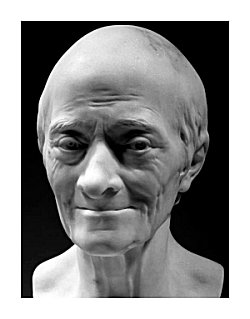
Voltaire
(1694-1778)
A Mme du Châtelet
” Si vous voulez que j’aime encore,
Rendez-moi l’âge des amours ;
Au crépuscule de mes jours
Rejoignez, s’il se peut, l’aurore.
Des beaux lieux où le dieu du vin
Avec l’Amour tient son empire,
Le Temps, qui me prend par la main,
M’avertit que je me retire.
De son inflexible rigueur
Tirons au moins quelque avantage.
Qui n’a pas l’esprit de son âge,
De son âge a tout le malheur.
Laissons à la belle jeunesse
Ses folâtres emportements.
Nous ne vivons que deux moments :
Qu’il en soit un pour la sagesse.
Quoi ! pour toujours vous me fuyez,
Tendresse, illusion, folie,
Dons du ciel, qui me consoliez
Des amertumes de la vie !
On meurt deux fois, je le vois bien :
Cesser d’aimer et d’être aimable,
C’est une mort insupportable ;
Cesser de vivre, ce n’est rien. “
Ainsi je déplorais la perte
Des erreurs de mes premiers ans ;
Et mon âme, aux désirs ouverte,
Regrettait ses égarements.
Du ciel alors daignant descendre,
L’Amitié vint à mon secours ;
Elle était peut-être aussi tendre,
Mais moins vive que les Amours.
Touché de sa beauté nouvelle,
Et de sa lumière éclairé,
Je la suivis; mais je pleurai
De ne pouvoir plus suivre qu’elle.
Voltaire poetry
fleursdumal.nl magazine
More in: Archive O-P, MONTAIGNE, Voltaire
Thank you for reading Fleurs du Mal - magazine for art & literature